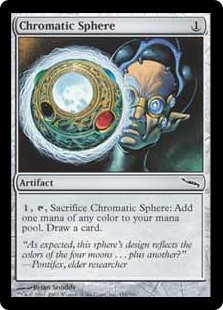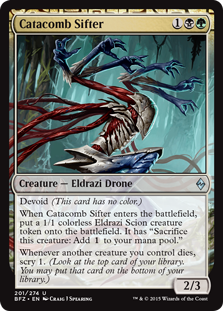Magic is a complex game. One of its defining aspects is the ability for each card to change the rules of the game. Cards are like objects that contain everything you need to know about how they affect the game, within a general set of rules that interprets how cards interact. Just about anything is possible, if you get the right set of cards together. Some strategies chain a few cards together and win quickly, while others grind slowly.
As Magic has become a thoroughly-studied and established game, more people understand the fundamental interactions of the game. We might not be able to agree what “Tempo” means, but we understand that cards in hand and total mana used in a game are resources—your opponent doesn’t get points for having five cards in hand when you use your last card to win. People study all the opportunities and interactions in Magic, looking for incremental edges. Understanding momentum to know how to push a small edge into an insurmountable one.
Eventually, in any system that is studied, we will find ways to manipulate large-scale events in the game through series of small actions and events.This micro-actions may not even look like normal Magic strategy. If you find a way to manipulate resources repeatedly, you can probably win the game. Sometimes these strategies break the spirit of Magic, arguably, like in a Vintage or Legacy dredge deck that makes all actions through discarding and milling cards into the graveyard, where they have manaless abilities. But plenty of these strategies still look like regular Magic.
The most simple, degenerate way to win is turn one Mountain, [casthaven]Black Lotus[/casthaven], [casthaven]Channel[/casthaven], [casthaven]Fireball[/casthaven]. The most complex, degenerate way is by cracking eggs two hundred times to cycle through your deck until you activate [casthaven]Pyrite Spellbomb[/casthaven] for lethal. Or perhaps you can play the Four Horsemen Legacy deck, which I believe is banned from being executed by the tournament rules because it requires such extensive loops. I don’t even know, it’s so convoluted. A more moderate, relevant example is Melira infinite life combo in Modern. You can gain as much life as you want, but only because we agree to shortcut through thousands of game events.
Even Standard has decks that operate at this incremental level. [casthaven]Rally the Ancestors[/casthaven], [casthaven]Catacomb Sifter[/casthaven], [casthaven]Zulaport Cutthroat[/casthaven]. [casthaven]Dark Petition[/casthaven] and [casthaven]Seasons Past[/casthaven]. [casthaven]The Great Aurora[/casthaven], even. These decks can win quickly or slowly, but either way they make tons of small game events. You don’t just flash in Avacyn and attack a few times to win. You might scry twenty cards into your deck, cast [casthaven]Collected Company[/casthaven], choose from four creatures with different triggered abilities, set them up and work through the chain, only to do it again a few turns later.
In paper Magic, we become adept at these interactions and breeze through them. Competitive players can process a lot without having to break down every trigger. Even then, I remember Grand Prix Oakland in January, where Rally players were going to time and drawing left and right. Even i fyou could play quickly, your opponent might slow it down to process the interactions. Once you go through them all, the round time isn’t sufficient. And on Magic Online, you don’t win matches 1-0, or draw them. If you run out of time, you lose.
If you can’t win without clicking “ok” 200 times, while scrying in between, then you simply can’t play the deck and expect to win. You see this play out in online constructed metagames. In Modern, how often do you face a Melira deck online? How many people have given up on playing Cryptolith Rite decks online in Standard when Green White Tokens takes a lot less click effort and crushes the metagame? Even in the heyday of Splinter Twin, some online opponents would refuse to concede to the infinite combo in the hope that their opponent would time out or misclick.
Online you cannot shortcut through all these complex card interactions. Magic was not built to run smoothly through a computer rules engine. This means some strategies are less viable online than they are in paper. The online metagame diverges from paper for many reasons, like cost, but efficiency of the deck within the online rules engine is an important and often-overlooked factor.
Magic R&D, in their infinite quest to make new and complicated limited formats, maybe have stumbled into a similar problem in recent sets. Last weekend I played in the online Shadows Over Innistrad sealed PTQ. Here is the deck I built:
Clue Season
This deck is pretty sweet. It’s not a broken deck liked you’d hope to open ina large PTQ. But it is very powerful and will win the long game eventually. But it is so slow! I decided not to include Relentless Dead because they felt too durdly. I sided them in for the black vessel, which felt useless, and found that the deck needed to durdle a lot.
After losing round one to an aggressive deck, who needed two Angelic Purges on the final turn of game three to win, I soon found myself 0-2 after running out of clock in game two of round two, a turn or two from winning the match 2-0. I ran out of time, in game two, while doing exactly what my deck wanted to do to win. It felt gross. As I played out the remaining six rounds for fun (and cleaned my apartment between rounds to make use of my Sunday morning) I found that the deck had a hard time functioning as it should within a 25 minute round clock. With tight play I could have made top eight of a paper tournament with this deck, but online it was not viable.
And yet I played out all six remaining rounds, finishing 3-5, with no hope of prize, all because the deck was fun to play. I lost two rounds to timing out, and won another when my opponent timed out first. In other rounds, things happened quickly enough, good or bad, that time wasn’t a huge factor. But I felt pressed to play as quickly as possible from the start of each match.
I felt disappointed. I love the slow interactions and subtle cumulative effects hidden throughout Magic. Playing this sealed deck was my kind of fun. But if Wizards wants to keep pushing Magic in these directions, at least as one strategic option among many, then the limitations of the online rules engine may become a real problem. Online Magic needs a technological revolution to keep pace with the paper game. If the long term future is purely digital, it will be a major challenge to avoid watering down the complex rules and individual card power to mak ethe game fully functional on a strategic level.
At the end of the day, know this: when playing online you should be aware of how much time and how many clicks and steps your deck requires to win. Better online strategy may require choosing simply, faster decks. And the reverse is true as well: if you test primarily online for a paper tournament, you may miss playing against very slow decks that will show up in the flesh. This applies to both constructed and limited.
As for the growth of Magic, I’m sure the smart folks at Wizards are thinking about online clock limitations, trying to innovate and improve. I wish them luck.
Carrie O’Hara is Editor-in-Chief of Hipsters of the Coast.C




